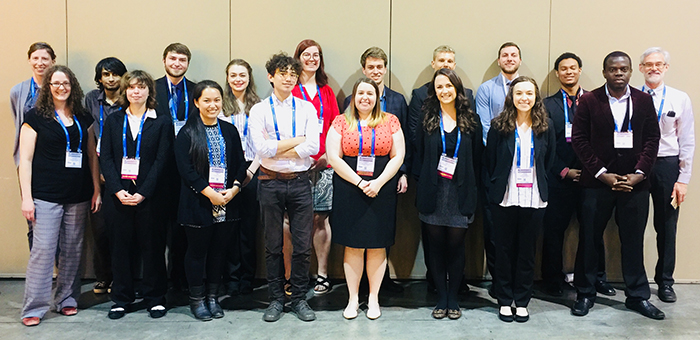
CONWAY, Ark. (April 9, 2018)
– Fourteen Hendrix College students recently presented their research at the
national meeting of the American Chemical Society in New Orleans, La. The theme
for the society’s 255th national meeting was “Nexus of Food, Energy & Water.”
Accompanied to the meeting
by Chemistry Department faculty members Dr. David Hales, Dr. Courtney Hatch, Dr.
Heidi Dahlmann, and Dr. Michael Yanney, and Laboratory Manager Linda
Desrochers, the students prepared research posters and shared their research
with conference attendees from throughout the world.
Students and their
presentations included:
- Iad
Alhallak ’18, a biochemistry/molecular biology major from Paragould, Ark. –
“Kinetic analysis of Supported Lipid Bilayer (SLB) formation through variation
in lipid concentration”
- Megan
Cassingham '19, a chemistry major from Shreveport, La. – “Qualitative analysis
of PM2.5 organic compounds in Conway, Arkansas”
- Morgan
Dasch ’19, a chemistry and French double major from Lakewood, Colo. –
“Measurement of the activation parameters for fragmentation at penultimate
proline in three tetrapeptides”
- Chelbi
Gilmore ’20, a biochemistry/molecular biology major from Alma, Ark. – “Alanine
helix length affects peptide fragmentation rate at a nearby proline residue”
- Connor
Griffin ’19, a biochemistry/molecular biology major from Little Rock, Ark. –
“Exploring the use of both planar and curved Surface polycyclic aromatic
hydrocarbons in the design and synthesis of molecular receptors for fullerenes”
- Michael
Kramer ’18, a biochemistry/molecular biology major from Heber Springs, Ark. –
“Design and synthesis of an effective tridental molecular receptor for
fullerenes”
- Alexis
Krone ’18, a chemical physics major from Greenbrier, Ark. – “Understanding the
effect of osmotic pressure on the adsorption and rupture of phospholipid
vesicles on a silicon dioxide surface”
- Catherine
Lee ’18, a biochemistry/molecular biology major from Conway, Ark. – “Design and
synthesis of triphenylene based molecular receptors for fullerenes”
- Eugene
Pegues ’18, a chemistry major from Greenbrier, Ark. – “Development of a
reusable colorimetric surface tethered polydiacetylene biosensor”
- Evan
Rivera ’18, a chemistry major from Dallas, Texas – “Organocatalyzed pericyclic
reactions: exploring catalyst reactivity and substrate scope”
- Imran
Shah ’18, a chemistry major from Coppell, Texas – “Effect of the Hofmeister
series on Supported Lipid Bilayer (SLB) formation”
- Madison
Sipes ’18, a chemistry major from Conway, Ark. – “Water adsorption on volcanic
ash as a function of relative humidity”
- Ryan
Tumminello ’18, a chemistry major from Saint Louis, Mo. – “Quantification of
soluble ions in atmospheric particulate matter using ion chromatography”
- Kathleen
Wendover ’18, a biochemistry/molecular biology major from Littleton, Colo. –
“Elaboration, characterization & biodegradation of partially bio-based
polymer composites in aerobic and anaerobic conditions”
About
the American Chemical Society
With more than 150,000
members, the American Chemical Society (ACS)
is the world’s largest scientific society and one of the world’s leading
sources of authoritative scientific information. A nonprofit organization,
chartered by Congress, ACS is at the forefront of the evolving worldwide
chemical enterprise and the premier professional home for chemists, chemical
engineers and related professions around the globe.
About
Hendrix College
A private liberal arts
college in Conway, Arkansas, Hendrix College consistently earns recognition as
one of the country’s leading liberal arts institutions, and is featured in Colleges That Change Lives: 40 Schools That
Will Change the Way You Think About Colleges. Its academic quality and
rigor, innovation, and value have established Hendrix as a fixture in numerous
college guides, lists, and rankings. Founded in 1876, Hendrix has been affiliated
with the United Methodist Church since 1884. To learn more, visit www.hendrix.edu.